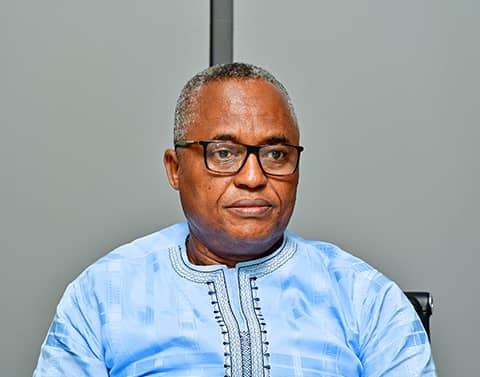
By Christian Gidisu
Accra, Ghana-
After nearly three decades of distinguished service in Ghana’s public sector, Dr Isaac Crentsil, former Commissioner of the Customs Division of the Ghana Revenue Authority (GRA), now faces one of the greatest tests of his career. Once celebrated as a reform-minded leader who helped reshape Ghana’s customs operations, he has recently become the focus of a corruption investigation by the Office of the Special Prosecutor (OSP).
While the legal process continues, many observers, especially those within the port and trade community, recall a man whose leadership brought measurable transformation to customs operations, and who consistently championed integrity and innovation in public service.
A Career Built on Discipline and Reform
Dr Crentsil’s career in the Customs Division spans more than 32 years, marked by a steady rise from the rank of deputy commissioner with supervision of the sector commander of Tema, and later to Commissioner of Customs.
As Sector Commander for Tema, he was credited with improving revenue mobilisation and tightening oversight at Ghana’s busiest port. Under his supervision, Tema Customs recorded remarkable compliance improvements and strengthened relations with freight forwarders, importers, and the trading community.
When he assumed the role of Commissioner of Customs in 2017, Ghana was undergoing a wave of reform in port administration. Dr Crentsil became one of the leading voices behind the introduction of the paperless port clearance system, which aimed to reduce human contact, minimise corruption risks, and speed up trade processes.
According to reports at the time, the initiative achieved an 85% success rate within its first year, cutting delays and improving revenue performance. Industry stakeholders also credit him for reducing the number of inspection agencies at the ports from sixteen to three, a move that drastically improved efficiency and transparency.
He was equally vocal about trade integrity, warning customs officers to desist from working with middlemen known as “goro boys,” and personally championed capacity-building drives, including an initiative to recruit and train 5,000 young graduates to boost customs operations across Ghana’s entry points.
A Commitment Beyond the Uniform
Beyond his official duties, Dr Crentsil has often been described by colleagues and community members as an affable and philanthropic individual.
His support for educational and community-development projects in and around Tema, Takoradi, and parts of the Central Region earned him recognition from several local groups.
Known for his modesty and approachability, he frequently engaged with the media and civil society on matters of public accountability, a rare trait among senior officials.
His academic and professional background also underscores his dedication to ethical standards. Holding a chartered diploma in forensic audit, Dr Crentsil once served as Deputy Commissioner in charge of Post Clearance Audit, a position that demanded deep technical expertise and transparency in evaluating trade and customs declarations.
The Current Scrutiny
In recent months, Dr Crentsil’s name has surfaced in the OSP’s ongoing investigation into alleged irregularities in contracts between the GRA and Strategic Mobilisation Ghana Limited (SML), a private company engaged to assist in revenue assurance and monitoring services.
Reports indicate that the OSP is examining aspects of the contract and the roles played by both public and private officials.
While the investigation remains ongoing, no court has yet found Dr Crentsil guilty of any offence, and he has not publicly commented on the matter.
Observers within the trade and tax fraternity have, however, raised questions about the broader implications of the case:
Should a retired public servant with decades of expertise be barred from contributing to private-sector projects within the same field?
How transparent is the OSP’s process, and at what point did Dr Crentsil’s involvement with SML become a matter of public concern?
And what measures exist to protect both accountability and the professional dignity of former public officers who continue to serve Ghana in other capacities?
Balancing Reform, Reputation, and Accountability
For many within the customs and trade community, Dr Crentsil represents a generation of public servants who combined discipline with innovation. His reforms, particularly the digital transformation of Ghana’s ports, continue to shape the country’s revenue systems today.
Even as the investigation proceeds, stakeholders insist that public discourse should be grounded in fairness and evidence, not speculation or character judgment.
“Dr Crentsil’s record speaks for itself,” one senior port official noted. “He helped move customs into the digital age. Whatever the current inquiry reveals, we should not erase the legacy of his service.”
“Is the OSP suggesting that Dr Crentsil, a former Commissioner who holds a chartered diploma in forensic audit and who once served as Deputy Commissioner in charge of Post Clearance Audit, would not have known how to cover his tracks if he had indeed engaged in any wrongdoing, whether in or out of office?” another officer quipped.
The Larger Picture
The situation has once again highlighted Ghana’s delicate balance between integrity in public life and fair treatment of career public officers who transition into the private sector. It also raises important questions about how institutions can investigate alleged wrongdoing without undermining the morale of honest professionals who have dedicated their lives to national service.
As Ghana continues to strengthen its anti-corruption systems, observers hope that the process will be guided by fairness, transparency, and respect for the rule of law, principles that Dr Crentsil himself upheld throughout his public career.
A Legacy Still Being Written
Dr Isaac Crentsil’s story is still unfolding. Whether viewed as a reformer under fire or a professional caught in an institutional test of accountability, one fact remains: his contributions to customs modernisation and public administration have left a lasting mark on Ghana’s governance landscape.
For now, Ghanaians watch and wait, hopeful that justice, fairness, and truth will ultimately define the legacy of one of the country’s most experienced customs leaders.

